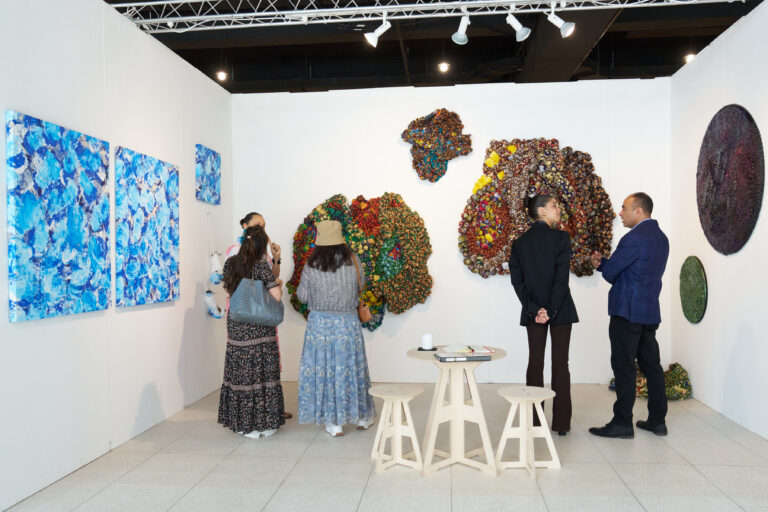Above: serpentwithfeet, “soil,” album cover art, 2018.
This essay is the third chapter of the series, “Pageants of Grief: Handling Loss in the works of Donald Glover, Jaamil Olawale Kosoko & serpentwithfeet.”
Calling God “Sir,” was not patriarchal, but it was a way of slapping the enslaver in the face and saying, “You’re not my Sir, you’re not my master.” So, at the heart of it was a very vibrant form of religion and a reaffirmation that black people refused to bow down because what white supremacy requires you to do is bow down at the altar of whiteness.[1]
— Ruby Sales, Ruby Sales – Where Does it Hurt? (2017)
We are all meant to be mothers of God, for God is always needing to be born.[2]
— Meister Eckhart (c. 1300AD)
Triggering the fall of man, the serpent was cursed by God to crawl on his belly and eat dust for all the days of its life; the cost of bestowing the gift of disobedience unto humanity. Like the serpent, Josiah Wise of serpentwithfeet gifts us, through his album ‘soil’, a transgressive and subversive theology in how we may relate to loss and love. Though his pseudonym suggests a pre-cursed disposition (feet still intact, not yet crawling on his belly), Wise’s lyrics position him with a closeness to the ground, the earth, the underground and the buried. Speaking of love with many references to burial, planting, unearthing, sowing, Wise assumes the role of a fallen angel, flightless and displaced from the Heavens, finding meaning, love, and God again, not in the sky, but in the humble dirt. Proposing alternative virtues through a lens of black queer love, ‘soil’ reads like a selection of hymns underscoring experiences of heartbreak, loss and newfound love, from the perspective of an outcast disciple, hungry for a God. We may regard God, in this case, as synonymous with essential meaning, a reason for being, living and loving – the central focus of one’s devotion. What ‘soil’ offers us, then, is a radical reimagining of what it means to mourn and love, these two actions never being too distant in meaning or function.
I love all your ex-boyfriends, I love the way they kiss
I’m happy to know, we all carry your assets
Baby boy, as their bodies, their bodies coiled around mine
We sang your name in harmony, we sounded just fine[3]
Fallen from the graces of an ex-lover, exiled to godlessness and a vacuum of love and worship, Wise, in ‘fragrant,’ contacts all the ex-boyfriends of his now lost God. This coven of exes mourns the loss of God, love, and meaning, by engaging in a grieving orgy of kisses and caresses, where their “endured absence” renders them “intermittently, unfaithful.”[4] Conscious of the transgressive nature of their worship – defying a God who has excommunicated his worshipers – Wise boasts his enjoyment of “this illegal love.” Enjoying their ex’s traces of scent and taste left in their mouths and bodies, singing his name in choral harmony, ‘fragrant’ stages a site for mourning where the weight of loss is softened through an effort of communal erotic healing. Savouring and celebrating its traces and residue, the object of these lovers’ loss is remembered potently in a renewed love they share with one another.[5]
Furthering this excommunication from God, ‘mourning song’ laments Wise’s fall from the graces of Heaven, which renders him a demon. Wrapped up in the throes of loss, Wise declares his desire to “make a pageant of [his] grief, cut [their] old bed in half and carry [his ex’s] side everywhere with [him],” sparking an image resonant of Christ carrying the cross en route to his crucifixion. “Not letting go yet” and “not over it yet,” Wise devotes himself to his loss, bearing a conviction and reverence for the full experience of grief. Declaring “It’s a gift to miss you,” and questioning, “what kind of lover would [he] be if [he] didn’t properly grieve,” the care and devotion Wise apply to his loss draws on a reservoir of creative spiritual energy.[6] Knowing the importance of keeping the memory of loss alive – of keeping love alive – there is a sense of duty, labour, and commitment in the worship and upkeep of love, even if that love has been excommunicated.
In the theology proposed by ‘soil,’ the object of loss, the wounding object, is remembered and kept alive through an active searching as disciples. Residue and traces, such as the tastes savoured in ‘fragrant’ or the scent followed in ‘waft,’ are sought after with unwavering conviction. The imaginative devotion at work breaks down and reconfigures the wounding whole of loss, segmenting it as traces and materials and dispersing these in an atmosphere of memory. The site of the scar, then, is a sublimated field of possibility, where the memory of loss is transformed and disseminated into the air and ground itself, the very essence we find ourselves floating in. The disciple’s role, then, is not one of finding or restoring the original lost god but, instead, involves the collection of the residual energies and meanings of loss, redistributing these into the fabric of the world. Subverting the mourner’s responsibility and perspective, what is lost is not eradicated but assumes a new form in the residual particles of memory.
The burial of loss and love within oneself, as a means to keep both safe, is echoed in the album’s opening and closing tracks (‘whisper’ and ‘bless ur heart’ respectively). In ‘whisper,’ Wise hospitably beckons love into him, promising “There’s space for you right here in this home / in this home of my body, in this home.”[7] From this opening point of ‘whisper,’ moving through the album, Wise retains approaches of secrecy, burial, and introversion in how he holds onto love and loss. Not yet ready to share either laid hidden and protected at his core, Wise treats loss and love as alchemical ingredients, memories collected from those reconfigured traces, maturing and crystallising beneath his surface until they are ready to emerge in metamorphose.
In reaching ‘bless ur heart,’ Wise is prepared to “give these books away.” Disseminating his love by burying it for others to read and share, “what was once a whisper would become a deep rumbling sound.” No longer kept hidden, the celebration of his love, formed after a contemplative trial of loss, is shared beyond the confined intimacy of himself and his newfound God. On ‘bless ur heart,’ Sasha Geffen describes the love being shared as “a connective force, not an isolating one. It draws you more deeply into the world and the people you share it with; it teaches you to open yourself, to be porous.”[8] Beckoning us to “keep a tender heart,” ‘soil’ in its totality clamours for a culture of vulnerability and porosity. In the labours and difficulties of loss and love, tenderness does not give way to the throes of an irreparable cynicism and remorse. On gifting ‘soil’, Wise hopes his “words bring [us] something new,” a prayer that we, who have loved and lost, may open ourselves and receive new theologies of mourning and revise the boundaries of our devotion. Where grief is not so lonely or repressed but, where loss may be buried within ourselves, growing as we grow, where we may still be held, in freedom, by the love of gods and lovers since lost.[9]
The Fondness of Memory
There are many witnesses to my past, people who’ve disappeared, people who are dead, whom I loved. But I don’t feel there are any ghosts, any regrets. I don’t feel that kind of melancholy at all. No nostalgia. Everything is always around and before you. Novels that haven’t worked, love, struggles. And yet it all gives you something of immeasurable power.[10]
— James Baldwin, The Art of Fiction No. 78 (1984)
There is power, health, and shelter in grief. Where loss reads as the illegible and incomprehensible open wound, grief is the creative reflection on the scar, where past pain can be reviewed, re-imagined and reformed. Where our loss cannot be read or experienced by others, the sharing of our grief is an invitation to soothe the passage of trauma by a radical effort of collective memory. A critical consideration of memory and staging of grief is tending to loss, in such a way that the past is not taken for granted. Awakening from the unwilling possession loss forces us into, collective grief positions those in mourning as active mediums, recalling, honouring and celebrating the ancestral voices of those that came before us. Without burying loss from our memories, how may we curate the wound of loss as a site for rest and communal healing? Without taking a loss for granted, what new meaning, lives, and futures can we imagine for ourselves beyond our present condition? Engaging with those objects that burden us with their absence, grieving imbues our wounds with a magical and imaginative promise; a future of recovery and the recovery of our future.
[1] Ruby Sales, “Ruby Sales: Where Does it Hurt?,” On Being, Podcast audio, September 15, 2016, https://onbeing.org/programs/ruby-sales-where-does-it-hurt/.
[2] Meister Eckhart, Sermons (MI: Christian Classics Ethereal Library, 2001).
[3] serpentwithfeet, “fragrant,” June 2018, track four on soil, Secretly Canadian, digital release.
[4] Roland Barthes, A Lover’s Discourse (USA: Hill and Wang, 1978), 14.
[5] serpentwithfeet, fragrant
[6] serpentwithfeet, “mourning song,” June 2018, track five on soil, Secretly Canadian, digital release.
[7] serpentwithfeet, “whisper,” June 2018, track one on soil, Secretly Canadian, digital release.
[8] Sasha Geffen, “serpentwithfeet – soil,” Pitchfork, accessed June 24, 2018, https://pitchfork.com/reviews/albums/serpentwithfeet-soil/
[9] serpentwithfeet, “bless ur heart,” June 2018, track 11 on soil, Secretly Canadian, digital release.
[10] James Baldwin, interview by Jordan Elgrably, The Art of Fiction No. 78, The Paris Review, 1984.












